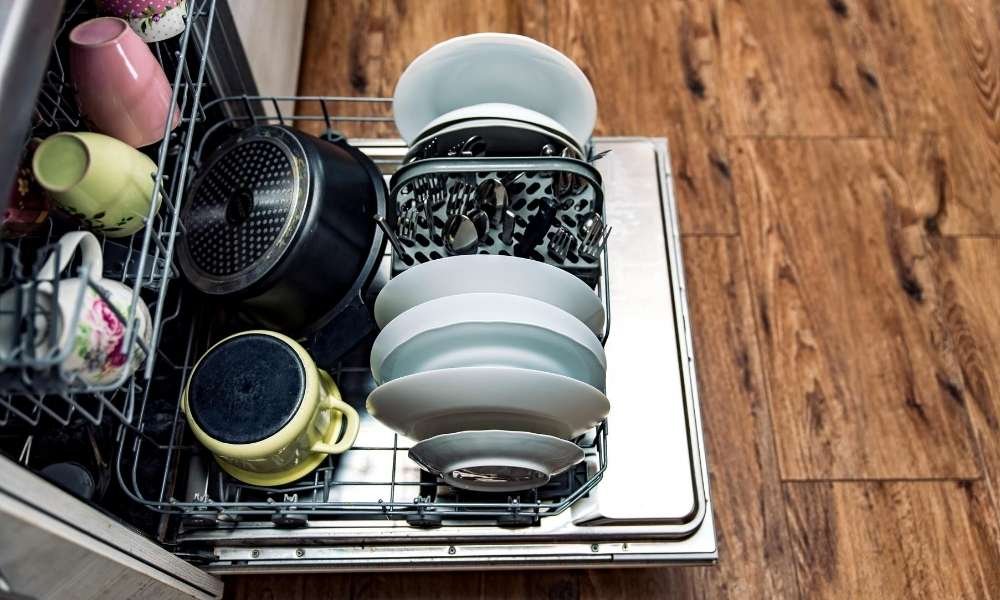Last updated on February 19th, 2024 at 12:02 am
How to choose a dishwasher? Investment in your first dishwasher will help get rid of all those dirty dishes that are piling up in your sink and all over your countertops. It will also save precious time in your busy life.
Just like any other first-time home appliance purchase, it’s important to make sure that you choose the dishwasher that is best suited to your particular needs. We’ve put together this page as an introduction to the world of dishwashers for new buyers, including some dishwasher tips and a features overview.
So, How to Choose a Dishwasher
Size Matters
The first thing that you need to decide about your new dishwasher is the size that you need for your home. A regular full-size dishwasher measures 24″ and has a capacity that will accommodate twelve to fourteen standard place settings, which is sufficient for a normal-size family.
If there are only two or three people currently living in your home, then you may want to go with something a little smaller.
A slimline dishwasher measures 18″ and it will hold six to eight standard place settings. This is adequate for smaller families, singles, or couples just starting out in a new home. This is also sufficient for kitchens that are not used often and in smaller living spaces, such as apartments.
Know Your Type
Once you have determined the amount of space you have available for your first dishwasher and the capacity you require, it is time to decide on the type of dishwasher that is right for you. Whether you are renting or owning your home is an important factor when choosing between a built-in, countertop, or portable dishwasher. Each model has its own benefits and disadvantages.
Exploring Features
Now that you know the size and type of dishwasher you need, it is time to explore the features that you want
With a standard 24″ dishwasher, the capacities across models and brands are only similar to a certain degree.
Racking and stacking options vary, which means certain models will allow you to fit more dishes per load.
Some of the most important dishwasher features include:
- Adequate stacking and racking options
- Air dry or economy
- At the very least, a two-tier wash spray action; however, three is best
- Built-in food disposal
- Child safety lock
- Delay start, which allows you to program washing outside of peak energy times
- Energy Star qualification, which means certain energy efficiency targets are met
- Heavy Scrub or Pots & Pans cycle
- Quiet package, which reduces operation noise
- Quick Wash Cycle
- Self-cleaning filters
If you are willing to pay more, you can opt for a dishwasher with all the bells and whistles, which includes a host of special features, such as:
- Adjustable shelving or enhanced stacking and racking
- Enhanced filtration
- Enhanced spray and wash
- Soil level sensors
- Sanitize cycle
- Enhanced quiet operation
- Rinse cycle, which loosens dirt and allows you to wait until you have a full load to begin the wash
- Special baskets for your smaller items, such as baby bottle rings and nipples
- Low water features save money by reducing water levels
It is important to note that features vary depending on the brand of the dishwasher that you choose. The big, renowned name brands are often more expensive, but you typically get a higher quality, better reliability, and oftentimes more features.
Time to Pay Up
For many people buying their first dishwasher, the budget can be an issue that limits what they can buy.
As a general guide to dishwasher prices:
- For an Energy Star-qualified dishwasher with optimal racking options and features, you should expect to pay around $500, although basic models may be available for less.
- Stylish high-end models with loads of features and a quality finish will run you more like $1000-1200.
- Countertop dishwashers usually cost about $200 to $300 and are perfect if you do not have the capability to install a standard unit or you move frequently.
- Compact models are around $400 and include more features and greater capacity than the countertop models.
You will not save much money by going with a portable unit, so if the installation is a possibility, it is the most convenient route. A large family is likely to find standard-size dishwashers with a reasonable number of options that will meet their needs. Couples may prefer countertops or compact models with more limited features.
You can opt for features as your budget allows, but sticking with just the essentials for your first dishwasher will keep costs low.
In thinking about how to choose a dishwasher, there are a few different approaches you can take depending on the type of person you are… You can do a lot of detailed comparisons. Or with a few quick searches and clicks of a mouse, you can have a new dishwasher delivered to your door within days!
In any case, the first thing you want to determine is how much space you have.
Not every home has the room to store a dishwasher. If the size of your kitchen is an issue, it may be time to undertake a remodeling project. But before you do something that major and expensive, be sure to consider all types of kitchen dishwashers.
You might be very surprised at the range of mini, portable and slimline models available. Some countertop models aren’t much bigger than a microwave and can be a great option as your first dishwasher.
We hope this part of our buying guide has given you a few ideas to get started. Remember, unless you’re installing a new kitchen, the first thing you always need to do is measure the space you have for your dishwasher. This will determine the size you can purchase and help to narrow down your choices.
Installing the Dishwasher
While room and size are important elements so is the installation of the dishwasher. Does it have easy access to water hoses and drains? Is the power outlet within reach of the area as well?
These are very important if the dishwasher cannot reach where it needs to, it is a bad investment. Now you get onto the fun part, the features.
Yes, it is fun, because there are many different features available for dishwashers, all of which are designed to make your life easier. So, which features do you want in your best dishwasher? Which features do you need? Let us have a look
Performance
Performance is ultimately important, not only do you want your dishes clean, but you want them really clean. Some options that you may want to consider include cycles and sensors. Cycle selection is probably very important to you.
The traditional dishwasher will have a minimum of three cycles, heavy, normal, and light. You might choose a dishwasher that has features such as pots and pans or even automatic sensors for optimal performance.
Other cycles might include:
- Sanitary Wash
- Delay Wash
- Sanitary Rinse
- Control Lock
Some of the best dishwashers feature a soil sensor. This will monitor the purity and cleanliness of the wash water.
This will ensure that the wash is not recoiled by dirty water. This is a great energy saver simply because it will make certain that your dishes are cleaned during the first cycle.
Temperature sensors may also be important. By having the temperature of the water at the right temperature, you will make sure that your dishes are receiving a sanitizing wash each time.
The noise level is also very important. Some dishwashers are noisier than others. You can determine the noise levels of your dishwasher by looking at the sound decibels and determining how loud or quiet it might operate.
Dishwasher Flexibility and Capacity
It is important to get a dishwasher that works best for you and your household. Each household is different. You might have odd-shaped dishes or have special demands. Your dishwasher should be able to answer these demands with complete ease.
Therefore, you want to look at many other aspects, other than just features. For instance, you want to look at the configuration and the size of the tub. You also want to focus on the flexibility allowed in loading.
To choose these features, you want to consider what dish type you generally wash in the dishwasher. You will definitely want to consider your larger or odd-shaped items such as pots and pans, wine glasses, baby bottles, and so forth.
The best dishwasher must answer your needs with ease. Make sure that you choose a model that has a silverware holder that is functional, which means it will hold the silverware, instead of letting it through.
Dishwasher Energy Efficiency
The great thing about dishwashers and many other major appliances is that today they have become more efficient and save energy than ever before.
Some models are more efficient than others, so it is important to compare models to determine how much you can save on money and energy. You can start by looking for the Energy Star icon. If a dishwasher is approved by Energy Star, it will save a minimum of 25% when it comes to energy than most other dishwashers.
Dishwasher Maintenance
Maintenance is very important. You want a dishwasher that is easy to maintain and will not break down easily. There are some dishwashers that make maintenance easy and a breeze.
You should look for appliances that offer disposers for hard food and filters. These are perfect for those who have to take care of really tough and soiled dishes.
Best dishwashers have features and cycles that are self-cleaning. This might include a wash and scrub option to help minimize hard water. You also want to look for dispensers that you need to make your cleaning job much more efficient and sanitary.
Dishwasher Buying Guide
Choosing a dishwasher can be a tough decision. We’ve developed a checklist to help you make the best possible selection.
Using a dishwasher instead of handwashing is usually an easy decision to make. After all, they are a wonderful time-saver. All you have to do is fill them up with your dirty dishes, add a little detergent, close the door, and let the magic happen. Clean sparkling dishes!
The tougher decision is choosing the dishwasher that best suits you, your family, and your home. This is a machine that you will be living with for quite some time, and most likely using every day.
Typically, a dishwasher lasts anywhere from six to twelve years. These complex appliances can also be quite costly, so it is important to choose wisely.
Questions to ask yourself when choosing a dishwasher:
What size and type of dishwasher do you need?
Size is the first thing to consider when choosing a dishwasher. Carefully measure the existing space in your kitchen. In some cases, you may need to do a little minor remodeling in order to make room for a new dishwasher.
This will help to narrow down the possible choices from the selection of various dishwasher types available. The choice of a built-in, drawer, countertop, or portable model depends on your budget and needs, but also whether you own or rent your home.
How big is your budget?
Before rushing into comparing models, take the time to determine the size of your budget. More features usually mean a higher price tag. Cheap dishwashers usually have fewer cycles, and more basic racks and baskets. You won’t get special features such as high heat drying, delay start, and sanitizing.
You have to determine if the benefit you get from additional features outweighs the impact on your budget. Visit our Guide to Dishwasher Prices to understand more about what you can get for your money. Keep in mind, also, that unless you are investing in a top-of-the-line model, choosing a dishwasher with more features may also mean an increase in electricity and water consumption.
What style of dishwasher do you need?
If your budget is limited, your style options may be limited too. Standard appliance finishes are white, black, or stainless steel. If you’ve got a little more cash to splash, then integrated models (with hidden controls and front panels matching your kitchen) and a much wider range of color and style choices are available.
What capacity do you require?
Capacity is measured in terms of the number of place settings that a dishwasher will hold comfortably. Small dishwashers will generally hold about eight place settings, while the larger models will hold up to sixteen place settings.
For a small household with one or two people, or when space is an issue, a compact dishwasher with room for around six place settings may be enough.
When considering your capacity needs, you should also think about any oversized or odd-shaped items that you wash frequently. Flexible racks and basket options can mean you get better use of the capacity that you have.
How do you plan to use your new dishwasher?
Will you be using your dishwasher frequently? Do you wash a lot of crystal or china? Are your dishes often heavily soiled? Do you want to avoid washing during peak energy times with a delayed start?
These are all questions that you need to explore when you are deciding on the features that you need to accommodate your household needs. It’s important to consider the dishwasher cycle and drying options. As well as other hidden aspects of electric dishwashers like food disposal grinders and self-cleaning filters.
When do you plan to use your dishwasher?
If you plan to use your dishwasher in peak electricity price periods, you should look for energy-efficient dishwashers. You may also want to choose a model with a delayed start so you have the option to wash the load at a more convenient time of day.
If your dishwasher is located in an area where your family sits down to eat, watches television, etc. the noise level may be a factor. If this is the case, look for quiet dishwashers that offer a noise package or other options for premium noise control.
Final Thought on Dishwasher Buying Guide
In conclusion, when you are in the market for a dishwasher, there are many factors to consider. But by taking the time to do your research and figure out exactly what you need and want, you can find the perfect dishwasher for your home. So what are you waiting for? Start shopping!




